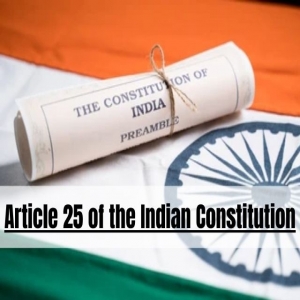
.png) Joseph Maliakan
Joseph Maliakan

In a blatant violation of Article 25 of the Indian Constitution, which guarantees freedom of conscience and free profession, practice, and propagation of religion to all citizens, the Bharatiya Janata Party government in Uttar Pradesh, on July 31, 2024, amended the 2021 Anti-conversion law, making it nearly impossible to get bail for any offence under the act, similar to as in cases of terrorism, narcotics, and money laundering.
The objects and reasons for bringing the amendment bill said that the original 2021 Act had to be made as stringent as possible given the "sensitivity and seriousness of the crime of illegal religious conversion, the dignity and social status of women, and the organised and planned activities of foreign and anti-national elements and organisations in religious conversion and demographic change."
In this context, the bill is silent about the identity of the foreign and anti-national elements and what demographic changes they have caused after or before the Anti-conversion law came into force. The 2021 law banned religious conversion through marriage, deceit, coercion or enticement.
The law was made specially to deal with 'love jihad,' a conspiracy theory formulated by Hindutva groups under which Muslim men are forcibly converting Hindu women through marriage to increase the Muslim population!
Union government agencies which investigated the conspiracy theory found no evidence of Muslims implementing the theory. However, the Uttar Pradesh government used the law extensively to target both minority Muslims and Christians in the state. Between January 1, 2021 and April 30, 2023, the UP police registered 427 cases under the act and arrested 833 people.
The amendments make the law extremely lethal. For one, anyone can now file a complaint under the act, whereas in the original act, only the victim or their relatives could. Further punishments for offences have been made more stringent. The punishment for any unlawful conversion under the act has been increased from one to five years imprisonment to between three and ten years. The minimum fine has also been increased from 15,000 rupees to 50,000 rupees.
The penalty for unlawful conversion of any minor, a woman or a person belonging to the Scheduled Caste or Scheduled Tribe has been increased from between two to 10 years of imprisonment to between five and 14 years of imprisonment. The minimum fine has been increased from 50,000 rupees to one lakh rupees.
The amendment has also introduced a fresh offence: using coercion or inducement to marry, traffic, or sell with the intent to convert the person. This is punishable by a minimum of 20 years imprisonment, which may even extend to life imprisonment.
In a 2023 study by Article 14, of 101 complaints registered under the UP Act, the complainant was not the victim or a relative of the victim in 63 cases. In many cases, the complainants were members of various Hindutva organisations. The amended provision in the act that enables anyone and everybody to file complaints will wreck the lives of interfaith couples and minority Muslim and Christian populations in Uttar Pradesh, where the police are known to be partial.
The conditions for bail have been made very stringent through the amendment to the act. No person accused of any offence under the act will be granted bail until the public prosecutor is allowed to oppose bail. If the public prosecutor opposes bail (which she or he will invariably oppose), the sessions court may grant bail only if "there are reasonable grounds for believing that the accused is not guilty of such offence" and that the accused is not likely to commit any crime if released on bail.
In fact, the bail conditions in the amendment are as stringent as those in the Narcotics Drugs and Psychotropic Substances Act 1985 and the Prevention of Money Laundering Act 2002. Under these acts, jail is the rule, and bail is the exception! Because for offences under the act, the accused is presumed guilty and has to prove one's innocence in the case BEFORE TRIAL, at the stage of bail.
Between January 21 and June 23, the courts in Uttar Pradesh considered 37 bail applications of people accused of various offences under the act and granted bail in 29 cases (78.3% of cases). However, the new provisions in the act will lead to a huge increase in the number of cases and rejection of bail applications. This will result in prolonged incarceration of people from the minority Muslim and Christian communities since most complaints under the act are against Christians and Muslims.
The constitutionality of the act is under challenge in the Supreme Court of India. A bunch of petitions challenging the act are pending before a three-judge bench of the Supreme Court comprising Chief Justice of India DY Chandrachud, PS Narasimha and JB Pardiwala. The matter was considered by the bench last on March 17, 2023. No date has been set for the next hearing. However, in a separate matter involving the act being heard by a bench comprising Justice Manoj Misra and JB Pardiwala in May 2024, Justice Misra remarked that "law in some part may seem violative of Article 25 of the Constitution". One can only hope that the Supreme Court takes up this critical issue of freedom of conscience and religion without further delay.